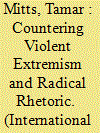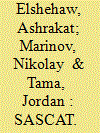| Srl | Item |
| 1 |
ID:
183781


|
|
|
|
|
| Summary/Abstract |
How do extremist sympathizers respond to counter-radicalization efforts? Over the past decade, programs to counter violent extremism have mushroomed around the world, but little is known of their effectiveness. This study uses social media data to examine how counter-radicalization efforts shape engagement with extremist groups in the online world. Matching geolocated Twitter data on Islamic State sympathizers with granular information on counter-extremism activities in the United States, I find that, rather than deradicalizing, these efforts led Islamic State sympathizers to act strategically to avoid detection. After counter-extremism activities, the group's supporters on Twitter who were in the vicinity of these events began self-censoring expressions of support for the Islamic State, altered profile images and screen names, and encouraged followers to migrate to Telegram, an encrypted network not viewable by the public. These findings reveal previously unknown patterns in the effects of counter-extremism programs in the digital era.
|
|
|
|
|
|
|
|
|
|
|
|
|
|
|
|
| 2 |
ID:
192880


|
|
|
|
|
| Summary/Abstract |
Existing datasets of economic sanctions rely primarily on secondary sources and do not tend to take full advantage of government documents related to economic coercion. Such data may miss sanctions, and do not capture important details in how coercive measures are threatened, imposed and removed. The latter processes often have much to do with the domestic politics in sender countries. Understanding these processes may be necessary in order to fully account for sanctions’ effectiveness. We present a natural language processing (NLP) approach to retrieving sanctions-related government documents. We apply our method to the case of US sanctions. The United States is the world’s pre-eminent user of sanctions. Our method can be applied to other cases. We collect all sanctions events originating in the office of the US president, and all congressional sanctions, for 1988–2016. Our approach has three advantages: (1) by design, it captures all sanctions-related documents; (2) the resulting data are disaggregated by imposing branch of government; (3) the data include the original language of the measures. These features directly shed light on interbranch delegation, domestic (partisan) conflict, and policy priorities. We show that our data record more episodes than most existing sanctions’ data, and have features that other datasets lack. The availability of the original text opens up new avenues for research and analysis.
|
|
|
|
|
|
|
|
|
|
|
|
|
|
|
|